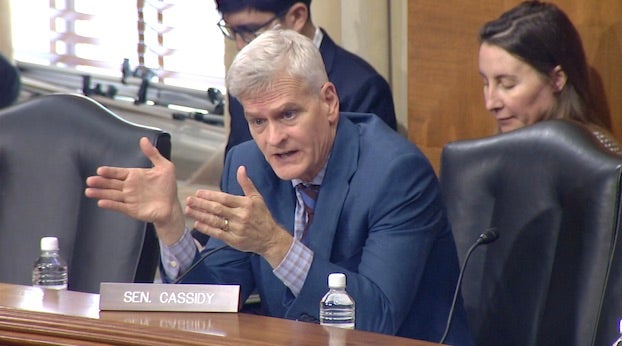Jim Beam column:Legislative leaders confident
Published 7:03 am Sunday, February 6, 2022

- The Power Coalition is made up of community-based organizations that work together to educate and empower voters across Louisiana and work for fair redistricting.
Republicans who have strong control of the Louisiana Legislature have apparently decided there is no reason to make any major changes in the state’s election lines. However, GOP leaders are probably going to try and add two more Republican seats in the state House so they can override gubernatorial vetoes.
The redrawing of election lines is required after the U.S. Census every 10 years. That applies to six public bodies — members of the U.S. House, members of the state House and Senate, the state Board of Elementary and Secondary Education (BESE), the state Public Service Commission that regulates utilities and perhaps the state Supreme Court.
Black spokespersons in the state and others outside the state have called for creation of another majority-minority district in the state’s six-member delegation in the U.S. House. There is currently only one of those district seats and it is held by U.S. Rep. Troy Carter, D-New Orleans. Republicans hold the other five seats and would lose one if another majority-minority district were created.
Trending
State Sen. Sharon Hewitt, R-Slidell, and chair of the Senate’s redistricting committee, said she is confident the current makeup of the state’s congressional delegation will be approved in court. And lawsuits are expected to be filed.
Civil rights groups say failure to create a second majority-minority district violates Section 2 of the Voting Rights Act of 1965. Blacks make up one-third of the state’s population, and they say one-third of six U.S. House seats is two.
Hewitt has good reason to believe the courts would approve the current makeup of the state’s congressional delegation. Events that occurred after the 1990 census explain why she feels that way.
The Voting Rights Act of 1965 outlawed discriminatory voting practices adopted in many southern states after the Civil War. To keep that from happening the act said the U.S. Department of Justice would have to approve election changes made in Louisiana and other southern states.
Louisiana legislators held a redistricting session in 1991, but it was only for the state House and Senate. The late Buddy Roemer was governor at the time and July 15, 1992, he vetoed the second version of a Senate plan, and the U.S. Justice Department said the House plan had some flaws.
Both plans were reworked and Roemer signed them into law on Aug. 4. The Justice Department approved both plans on Aug. 19. Those plans increased the number of Black-majority House districts from 15 to 27. They added four new Black-majority districts in the Senate to a total of nine of those districts.
Trending
The American Press reported on Jan. 1, 1992, that, “Voters were left with several problems, including where to vote, which candidates would be on the ballot and a final choice among what was often a roster of political strangers.”
The late Gov. Edwin W. Edwards began his unprecedented fourth term Jan. 13, 1992, and a new Legislature with more women and Blacks was sworn in for a four-year term.
The Legislature redrew the congressional election lines at their regular session. Louisiana lost the 8th Congressional District because of population losses and one writer said, “Do you know the name of your congressman? Do you even care? If so, give him a call. He may not be around next year.”
The Associated Press said redistricting was more painful that year than at any time in modern history. A congressional redistricting plan that was approved created that second majority-minority district.
The AP said it meandered in a narrow line across the top of the state, down the Mississippi River to Baton Rouge with fingers jutting up into Rapides and Lafayette.
State Sen. Cleo Fields, D-Baton Rouge, was elected to the U.S. House from that new majority-minority district in 1992. Federal courts rejected that district and drew up another one. Fields was re-elected to the new district in 1994.
The U.S. Supreme Court eventually ruled that political boundaries couldn’t be drawn for the sole purpose of boosting minority strength and the second minority district was dissolved. That may be the reason Sen. Hewitt believes her congressional district plan with only one minority district out of six will pass court muster.
The U.S. Justice Department that oversaw southern elections helped create Louisiana’s second minority congressional district that was eventually eliminated. However, the U.S. Supreme Court in a 5-4 decision in 2013 freed southern states from federal oversight of their election laws.
Whatever happens at the legislative session is expected to end up in federal court, so we will have to wait to see if Republican election plans survive in the courts.





